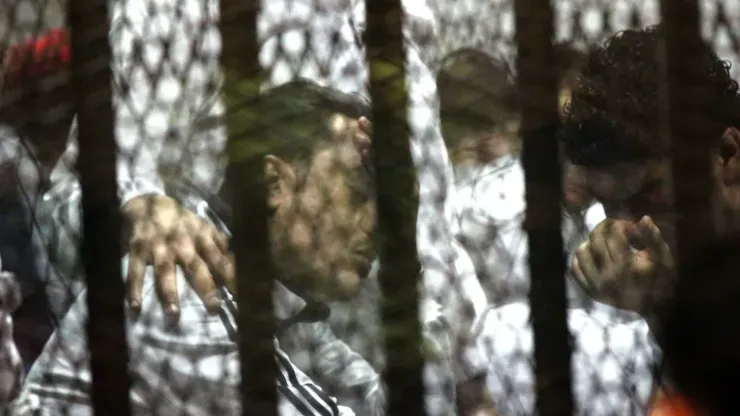Cairo (AFP) – A court Monday upheld death sentences against 10 people over rioting at a Port Said football stadium five years ago that killed 74 fans and sparked more violence in Egypt.
The February 2012 riot, the country’s deadliest sports-related violence, broke out when fans of home team Al-Masry and Cairo’s Al-Ahly clashed after a premier league match between the two clubs.
Ultras — hardcore football supporters usually blamed by the authorities for violence — were at the forefront of the 2011 uprising that unseated longtime president Hosni Mubarak.
The riot became one of the defining moments of the turbulence that followed Egypt’s uprising.
It sparked violent protests in Cairo where 16 people were killed in clashes with security forces and dozens of deaths in Port Said itself.
The Monday verdict of the Court of Cassation, Egypt’s highest appeals court, is final.
The date of the execution was not immediately announced.
The verdict was welcomed with relief by a group of 20 relatives of those who died in the 2012 riots, with many ululating outside the court as they held portraits of their dead kin.
“For five years my heart and my blood was boiling,” said Sareya Mohamed Ragab, whose 22-year-old son was one of the victims, adding that she can now “live again”.
Ahmed Mohamed, 59, struggled to hold back his tears as he clutched a portrait of his dead son Amr.
“I waited for justice for my son for six years, in torture and pain. Thank God the moment has come when I can say that justice has been done,” he said.
The court excluded an 11th defendant who remains at large after his death penalty was also confirmed in June 2015 by another court, but upheld prison sentences for around 40 other people.
The sentences include a five-year term for Port Said’s security chief at the time.
– Crowd ban –
After the riot, police detractors accused the authorities of having deliberately failed to intervene when the violence broke out to seek revenge for the active role Ultras played in the 2011 uprising.
One of the rallying cries at the 2011 revolution had been against alleged police abuse.
The overwhelming majority of those who killed in the 2012 riot were fans of Al-Ahly, one of Egypt’s biggest clubs which also enjoys overwhelming popularity in several Arab countries.
Al-Ahly have been crowned Egyptian champions a record 28 times, with arch-rivals Zamalek winning 12 times.
After the Port Said “massacre”, the government ordered premier league matches to be played behind closed doors and in 2015 a court banned Ultras clubs.
The fan ban was partially lifted in 2015, but was reinstated after a February 2015 stampede outside a Cairo stadium killed 19 fans on the first day games were open to the public.
Since the army deposed Islamist president Mohamed Morsi in July 2013, Egyptian courts have sentenced hundreds of Islamists to death in swift mass trials.
But many Islamists sentenced to death, including Morsi, have appealed and won retrials, frustrating government hardliners.
The country carried out its last execution in December against Adel Habara, a jihadist convicted of involvement in a 2013 shooting that killed 25 policemen in the Sinai Peninsula.
The shooting incident took place days after police killed hundreds of demonstrators in Cairo protesting against Morsi’s ouster.
Habara had become a symbol for government supporters of a slow appeals process. He had been sentenced to death in an initial trial but was granted a retrial on appeal.
President Abdel Fattah al-Sisi, the former army chief who toppled Morsi, had ordered changes to the law to speed up the judicial process after a car bomb killed the country’s top prosecutor in 2015.
Habara was the eighth convicted militant whose execution has been announced since Morsi’s overthrow.
200+ Channels With Sports & News
- Starting price: $33/mo. for fubo Latino Package
- Watch Premier League, Women’s World Cup, Euro 2024 & Gold Cup
The New Home of MLS
- Price: $14.99/mo. for MLS Season Pass
- Watch every MLS game including playoffs & Leagues Cup
Many Sports & ESPN Originals
- Price: $10.99/mo. (or get ESPN+, Hulu & Disney+ for $14.99/mo.)
- Features Bundesliga, LaLiga, Championship, & FA Cup
2,000+ soccer games per year
- Price: $5.99/mo
- Features Champions League, Serie A, Europa League & Brasileirāo
175 Premier League Games & PL TV
- Starting price: $5.99/mo. for Peacock Premium
- Watch 175 exclusive EPL games per season






